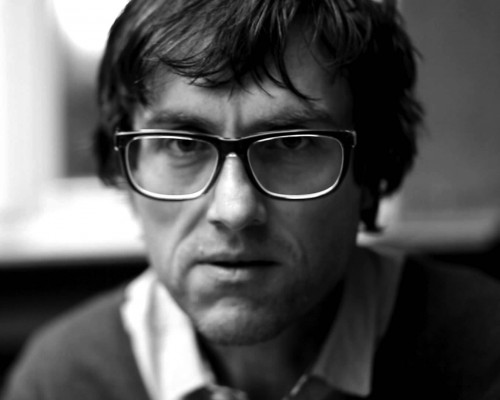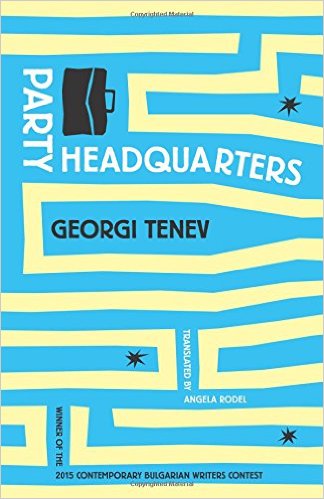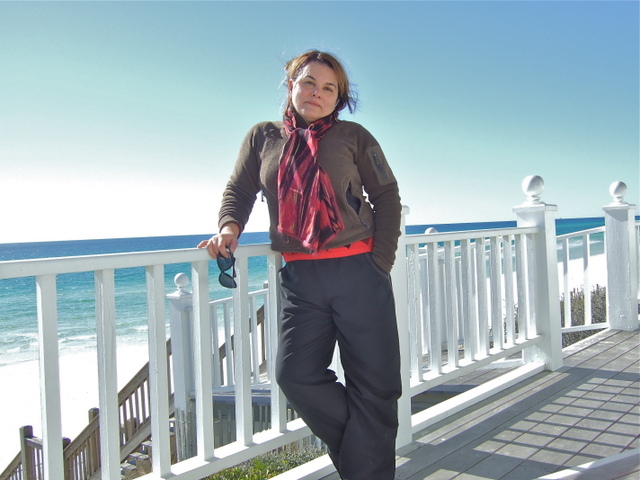In Party Headquarters Georgi Tenev reduces the traditional novel with its linear time, clear relationships, memory and complex characters to an indissoluble essence. Characters, for example, are nameless—they are merely bodies or even types. Memory, hallucination and current narrative merge creating a fluid world where time is relative. —Natalia Sarkissian
Party Headquarters
Georgi Tenev
Translation by Angela Rodel
Open Letter, 2016
Paper, 123 pp., $12.95
.
Almost thirty years ago, in the early hours of April 26, 1986, at Chernobyl’s Reactor No. 4, staff and emergency workers rushed headlong into the exploding core, oblivious to the chunks of smoldering graphite leaching radioactivity. Nearby, the water in the Pripyat River boiled. Fires burned. Ash rained down. Bodies melted, or they sickened, shriveled, died. Evacuation was slow for those living in towns closest to the catastrophe, while for others—for example in Communist Bulgaria—the news was kept from the populace. In fact, in Bulgaria, in the days and months afterward, only the families of elite Communist party officials were tested and cared for. Because Chernobyl had shown that the Soviet atom was unsafe—perhaps the Soviet system itself—the average Borises and Natashas were kept in the dark, their bodies left to soak up iodine-131, caesium-137, strontium-90 and radionuclides. Then, a mere three years later, the Bulgarian Communist Party Boss was deposed; the year after that Communist Party Headquarters in Sofia were torched by demonstrators. A new, transitional era was ushered in.
These historical events—the fallout, both radioactive and political—loom large in Georgi Tenev’s short novel, Party Headquarters. Set during the transition from communism to democracy (1989-1990s), Party Headquarters was first published in 2006, and now, with Angela Rodel’s translation into English, is available for the first time in English from Open Letter books.
An experimental work, organized into three short chapters which are, in turn, divided into non-chronological, discrete sections of memory, fantasy, and thinly disguised historical fact, Party Headquarters tells of tortured relationships and revenge. Gradually the reader pieces together the story. The protagonist, a nameless, ex Pioneer/Comsomol member who is obsessed by the past, must retrieve a suitcase full of money ($1.5 million)—an ill-gotten slush fund—from a Hamburg bank for an old communist party boss, “K-shev”.
K-shev bears a close resemblance to real-life strongman Todor Zhivkov. Not only does K-shev (like Zhivkov) keep quiet about Chernobyl, but he inflicted “the whole horror of experiencing communism, or socialism—call it what you will” on the country. But unlike Zhivkov, in an ironic twist of fate, K-shev is infected with leukemia and languishes in a Hamburg clinic. This may or may not be the “final proof needed to deify him once and all. [Because he is] A strange sort of god ready to die […] from an illness […] we ourselves all feared becoming infected with.”
Symbolically, the protagonist is K-shev’s son:
“He, the old man, makes love with the body of the motherland. This love gives birth to thousands of children and he organizes them into Pioneer battalions….”
The protagonist may even be K-shev’s son-in-law; the reader is never quite certain. What is clear is that he dreams of thwarting the old man’s wishes for glory after death by having his body cremated and his ashes scattered in outer space where “everything brought along from earth will lose its significance.” His revenge also includes “collision[s] of love” with a body/the bodies of women who may be either K-shev’s biological daughter or they may be symbolic daughters of the motherland. As the protagonist explains, “she is still a part of his body and he is present in hers…[It would be] the mirror of my masculinity, if it didn’t represent above all the risk of being accused of a crime.”
The novel opens in the middle of one vengeful physical encounter:
Even without the tears I still want to hit her, painfully hard. But when she cries it just gets out of control. The victim’s magnetic attraction inflames the perpetrator. I’m driven to tears myself—out of frustration that I can’t force myself to finish it off, to do absolutely everything I want to her. In exactly the order I would like.
If anyone were to see us at this moment, bawling, locked in this torture chamber at opposite ends of the bed—in the middle the bloody sheets are stained with wet spots, but not from blood, lymph, vaginal secretions, sperm, or who knows what else—could it be that some other beings are copulating here with us?—at that moment the shocked outside observer would think we are crying for each other, for ourselves.
Wrong. An incorrect judgement, a faulty interpretation of ambiguous facts. I’m not sorry. What can I say?
The protagonist’s desire for revenge resides in the exposure—to radiation, to socialism—that he suffered as a child, participating in Communist children’s Pioneer camp activities:
We had no way of knowing […] a few days earlier, a thousand kilometers to the north and east, Reactor No. 4 at Chernobyl had exploded, under the watch of the Fifth Shift [….] A strange taste invade[d] my lungs, the scent of ozone—what does ozone smell like anyway?—at least that’s what I tell myself now as I try to grasp something more, a greater meaning and importance held in those last few moments.
And the question I add to all this today: why didn’t anybody call out to us, tell us to come back? So many secrets in such a short time….
Just as under socialism—we do and did everything correctly, yet life, the world, continues to collapse beneath our feet like a reactor that has entered a runaway state of nuclear meltdown. Is there any need to explain what those two great liberating words mean: chain reaction?
A reaction that breaks chains.
With Party Headquarters Georgi Tenev won the 2007 Vick Prize for the Bulgarian novel of the year. A 1994 graduate of Bulgaria’s National Academy of Theater and Film Arts, Tenev (b. Sofia, 1969) studied under experimental Bulgarian artists such as Margarita Mladenova and Ivan Dobchev. A founder of the Triumviratus Art Group, he has written a number of novels, short stories, plays and screenplays that have been performed in Russia, Germany and France. In a recent interview, Tenev says his background in theater has strongly influenced him. “[It] taught me self-discipline: no mercy for the text, no respect for verbal beauty merely for the bon mots.”
It is evident that Tenev also experiments with structure. In Party Headquarters he reduces the traditional novel with its linear time, clear relationships, memory and complex characters to an indissoluble essence. Characters, for example, are nameless—they are merely bodies or even types. Memory, hallucination and current narrative merge creating a fluid world where time is relative. Roland Barthes’ zero point of literature may have been one influence. As the author states through his protagonist: “I had discovered the zero point within the system of coordinates. The place where everything begins and ends.”
The text has been skillfully translated by American Angela Rodel, one of the most prolific translators of Bulgarian literature today. The recipient of a PEN grant for the translation of Tenev’s collection of short stories, Rodel’s collaboration with Tenev here has yielded a book of haunting beauty built upon unexpected imagery. Pared down to the essential, there is no room for sentimentality.
Consider:
She, of course, is a virgin. And I press down on that barrier with the whole weight of my body, as if poured into a funnel. A whirlpool that changes my own anatomy: at the very bottom, in the center, the point that I flow through—this is where my heart is. And my belly button as well, and maybe even some steaming spot on my back has been sucked down into this vortex. While up above, all at once my head, legs, and bangs are the leftover silt in the funnel.
And:
I’m radiating rays, I’m lit up. Glittering nucleotides bursting from my body in all directions. The water tastes unbelievably bitter in my mouth, the stinging air envelops my hands, all the hairs standing on end in my skin shoot out arrows. Butterflies fall all around me, along with stunned spring sparrows, the frogs in the marshes don’t finish their jet-propelled jumps. The water fleas, legs splayed on the surface of the pond scum, lose their electrical footing. The miracle of walking on translucency has broken down.
Populated by bodies—corpses, near corpses, prostitutes, Pioneers, astronauts, lovers grappling with each other—Party Headquarters is a “bodily adventure,” as the protagonist says; fittingly so for survivors of nuclear catastrophe:
“The body, the flesh transforms itself according to its own laws [.…] no connection is more bodily than inheritance, which makes up the whole of you, yet which you also desperately want to get rid of more than anything.”
A disoriented and disorienting world, with bodies shattered or glowing with unnatural light, is Tenev’s dazing yet dazzling result.
—Natalia Sarkissian
NC
Natalia Sarkissian has an MFA in Writing from Vermont College of Fine Arts and was an editor and contributor at Numéro Cinq from 2010-2017.


